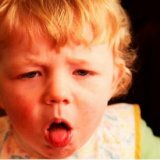Neuroses in children: classification, causes, symptoms and assistance to the child
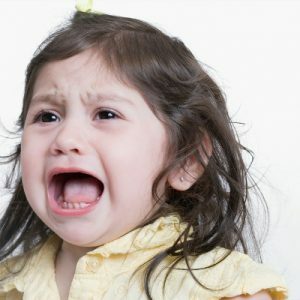 Neuroses are classified in medicine as a reversible dysfunctional state of the nervous system, provoked by experiences, unstable emotions, chronic fatigue and other factors.Such a diagnosis is often put to adult patients, which is not surprising in modern conditions of fuss, turmoil, problems and troubles.But doctors are worried by the fact that the neurosis has become "younger" - more often the specialists with the symptoms of this disease are brought to the children.
Neuroses are classified in medicine as a reversible dysfunctional state of the nervous system, provoked by experiences, unstable emotions, chronic fatigue and other factors.Such a diagnosis is often put to adult patients, which is not surprising in modern conditions of fuss, turmoil, problems and troubles.But doctors are worried by the fact that the neurosis has become "younger" - more often the specialists with the symptoms of this disease are brought to the children.
Classification of neurosis in childhood
Doctors differentiate severalkinds of neuroses that may occur is during childhood.Each of them has its own features, different individual characteristics and should be subject to professional treatment.
Anxiety( anxiety neurosis)
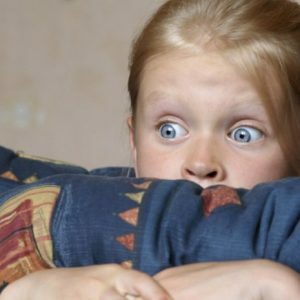 Anxiety is characterized by a paroxysmal character - they only occur in certain situations.Preschoolers are very often afraid of the dark, this anxiety can be amplified by parents as well - young children are frightened by "a woman, a black old woman".An attack of anxiety arises only before a night's sleep, during the rest of the day there are no manifestations of a neurosis of fear.
Anxiety is characterized by a paroxysmal character - they only occur in certain situations.Preschoolers are very often afraid of the dark, this anxiety can be amplified by parents as well - young children are frightened by "a woman, a black old woman".An attack of anxiety arises only before a night's sleep, during the rest of the day there are no manifestations of a neurosis of fear.
Junior school age is exposed to fear of a teacher, a new team of children, poor grades.According to statistics, this type of child neurosis is more often diagnosed in those children who did not attend kindergarten and immediately got into a large, school team with their own rules and duties from the home environment.
Note: the fear neurosis in this case is manifested not only stiffness, tears and whims, but also an active resistance to the offensive of "hour X" - children run away from home, skip lessons, there is a steady lie.
Child's Obsessive Compound Neurosis
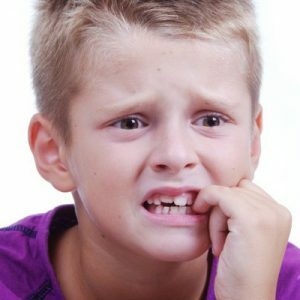 Neurosis of this type in childhood is manifested by involuntary movements that are absolutely not controlled - for example, flinching, blinking one or two eyes, sniffing, sharp turn of the neck, clapping the knees or the table and others.With the obsessive-compulsive disorder, neural tics may appear, but they are characteristic only during negative / positive emotional outbursts.
Neurosis of this type in childhood is manifested by involuntary movements that are absolutely not controlled - for example, flinching, blinking one or two eyes, sniffing, sharp turn of the neck, clapping the knees or the table and others.With the obsessive-compulsive disorder, neural tics may appear, but they are characteristic only during negative / positive emotional outbursts.
The category of obsessive states includes phobic neurosis - a condition in which a child develops a fear of calling to the blackboard at school, a teacher, a visit to a doctor, or a fear of enclosed space, height or depth.A very dangerous condition, when a child suffers from a phobic neurosis, and parents perceive this neurosis as a whim - reproaches, ridicule can lead to nervous breakdowns.
More details about obsessive neuroses are told by a specialist:
Depression psychosis
Depressive psychosis is more common in children in adolescence, characterized by very characteristic features:
- permanently depressed state;
- silent speech;
- always a sad expression on his face;
- reduced physical activity;
- at night worried about insomnia, and in the afternoon - drowsiness;
- privacy.
The psychologist tells how to deal with depression in adolescents:
Neurosis of hysterical nature
Well-known tantrums of young children in the form of falling to the floor, knocking on the floor, screaming and crying are a manifestation of a hysterical neurosis.Such a state of pre-school children is more likely to appear at the age of 2 years.
Neurasthenia
Children's neurosis, manifested by irritability, poor appetite, sleep disturbance and restlessness, doctors classify as neurasthenia, or asthenic neurosis.
Please note: this type of reversible disruption in question occurs due to excessive workload in the school, kindergarten or additional classes.
Neurosis of hypochondriacal character
Hypochondriacs are people who are suspicious and doubtful in everything.The similar name of neurosis indicates that children experience suspiciousness towards themselves, their mental and physical abilities, and health.Patients are strongly afraid of identifying a complex, life-threatening disease.
Stuttering of the neurotic etiology
Neurotic stuttering can occur between the ages of 2 and 5 years - the period when the child's speech is formed.It is noteworthy that the stuttering of neurotic etiology is more often diagnosed in boys and can be caused by excessive mental stress.
About the causes of stuttering and correction methods - in the video review:
Neurotic tics
They are also more inherent in boys, can be caused not only by the mental factor, but also by diseases.For example, with long-term conjunctivitis, a habit of rubbing the eyes is observed.The disease eventually cures, and the habit remains - a stable neurotic teak will be diagnosed.The same can apply to the constant "sloshing" of the nose or dry cough.
Similar motions of the same type do not bring discomfort to the normal life of the child, but can be combined with enuresis( bedwetting).
Sleep disorders of the neurotic etiology
The reasons for this neurosis have not yet been clarified, but it is suggested that sleep disorders of a neurotic nature can be caused by sleepwalking, talking in a dream, restless sleep with frequent awakenings.These same signs are also symptoms of a sleep disorder neurosis.
Enuresis and encopresis
Neuroses in preschool children can be of a purely physiological nature:
- enuresis - bedwetting, more often diagnosed at the age of 12 years, more typical of boys;
- encopresis - incontinence, is extremely rare and almost always accompanied by enuresis.
Doctors claim that neuroses accompanied by enuresis and / or encopresis are caused by overly strict education and great demands from the parents.
The pediatrician tells us about the methods of treatment of enuresis:
Pathological actions of habitual nature
It is a question of nibbling of fingertips, nicking of the nails, pulling out of the hair, swinging the trunk with rhythmic movements.This kind of neurosis in children is diagnosed up to 2 years and is very rarely recorded at an older age.
Causes of children's neuroses
It is believed that the main reasons for the development of neuroses in childhood are in the family, in the relationship between the child and his parents. There are the following factors that can provoke the formation of a stable child's neurosis:
- Biological.These include the features of intrauterine development of the child( oxygen deficiency), age( critical for the emergence of neurosis are the first 2-3 years of life), chronic lack of sleep, overload in mental and physical development.
- Social.Complicated relations in the family, the indisputable authority of one of the parents, the expressed tyranny of the father or mother, the characteristics of the child as a person.
- Psychological.These factors can include any psychological impact on the child of a negative nature.
Please note: these factors are very arbitrary.The fact is that for each child the concepts of "psychological impact, psychotrauma" have an individual emotional coloring.For example, many boys and girls will not even pay attention if their parents raise their voices, and some children begin to feel panic over their own moms / dads.
Main causes of neurosis in children:
- incorrect education
- complex relationship between parents;
- parents' divorce;
- family troubles even household nature.
The pathogenesis of neuroses in children and adolescents:
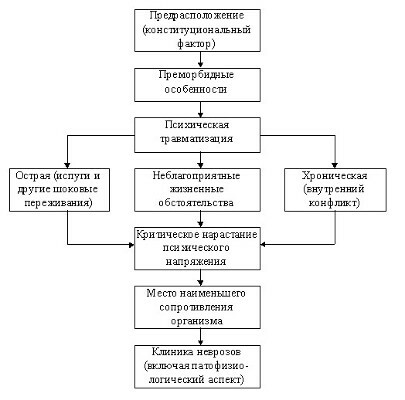
In no case can the child be accused of having a neurosis of any kind - he is not to blame for this, one should look for the cause in the family, specifically in theParents.
Please note: children with a pronounced "I" who are more likely to have their own opinion from a young age are more likely to develop neuroses, they are independent and do not tolerate the manifestation of even a hint of dictatorship on the part of their parents.Parents perceive this behavior and self-expression of the child as stubbornness and whims, try to influence by force - this is the direct path to neuroses.
How to help a child
Neurosis is considered to be a reversible process, but still it is a disease - treatment should take place at a professional level.Doctors dealing with the problem of children's neuroses have the qualifications of a psychotherapist and in their work use hypnotherapy, gaming, the treatment of fairy tales, homeopathy.But first of all it is necessary to bring order to the family, to establish the relationship between the child and the parents.
Very rarely neuroses in childhood require the appointment of specific medications, usually a competent specialist will find the option of providing assistance at the level of psycho-emotional correction.
As a rule, the results of treatment of children's neuroses will only be if not only the child but also his parents go to see a therapist. The healing of a child from neuroses will be facilitated by:
- drawing up a clear daily routine and observing the recommended regime;
- physical education - often it is sport that helps to get the child out of a neurotic state;
- frequent walks in the fresh air;
- spending free time is not in front of a computer or television, but in communicating with parents or friends.
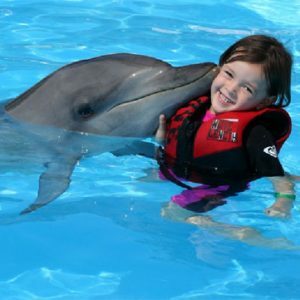 Very effective in the treatment of childhood neurosis hippotherapy( riding on horses), dolphin therapy, art therapy - in general, any non-traditional methods of correcting the psychoemotional state of the child.
Very effective in the treatment of childhood neurosis hippotherapy( riding on horses), dolphin therapy, art therapy - in general, any non-traditional methods of correcting the psychoemotional state of the child.
Please note: it is very important that the parents are also on the path of treatment - in case of choosing a therapy the child needs to take into account the parents' mistakes and try to level the stressful situation in the family.Only by working together as a parent / therapist / child can you achieve good results.
Neuroses of childhood are considered whims, pampering and character traits.In fact, this reversible condition can worsen and eventually develop into serious problems with the psychoemotional state.Patients of neuropathologists often admit that in childhood they often experienced fears, were embarrassed by large companies and preferred privacy.To prevent such problems from arising with your child, you should do your best to professionally overcome childhood neuroses.And no matter how banal it would sound, but only moderate love, the desire to understand the baby and the willingness to come to him for help in a difficult moment will lead to a complete cure.
To understand how you can help your child, and, most importantly, be able to recognize the signs of neurosis in time, we recommend that you view this video review.Neurosis is told by a child and adolescent psychologist with 10 years of experience, PhD in Psychology Anton Sorin:
Tsygankova Yana Aleksandrovna, medical reviewer, therapeutist of the highest qualification category.


